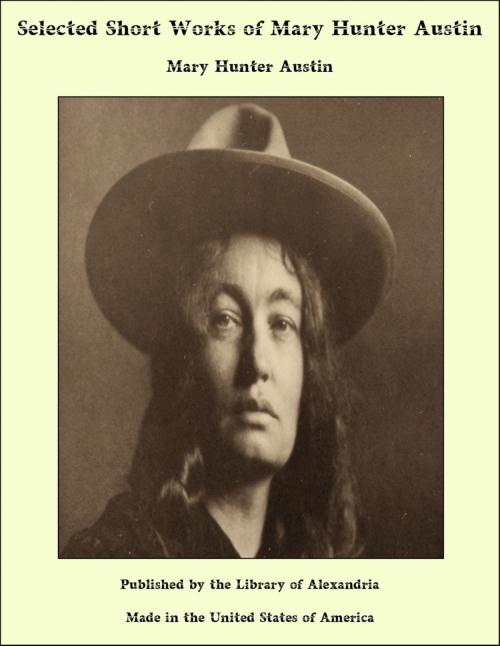Selected Short Works of Mary Hunter Austin
Nonfiction, Religion & Spirituality, New Age, History, Fiction & Literature| Author: | Mary Hunter Austin | ISBN: | 9781465611246 |
| Publisher: | Library of Alexandria | Publication: | March 8, 2015 |
| Imprint: | Language: | English |
| Author: | Mary Hunter Austin |
| ISBN: | 9781465611246 |
| Publisher: | Library of Alexandria |
| Publication: | March 8, 2015 |
| Imprint: | |
| Language: | English |
THE first time of my hearing of her was at Temblor. We had come all one day between blunt whitish bluffs rising from mirage water, with a thick pale wake of dust billowing from the wheels, all the dead wall of the foothills sliding and shimmering with heat, to learn that the Walking Woman had passed us somewhere in the dizzying dimness, going down to the Tulares on her own feet. We heard of her again in the Carrisal, and again at Adobe Station, where she had passed a week before the shearing, and at last I had a glimpse of her at the Eighteen-Mile House as I went hurriedly northward on the Mojave stage; and afterward sheepherders at whose camps she slept, and cowboys at rodeos, told me as much of her way of life as they could understand. Like enough they told her as much of mine. That was very little. She was the Walking Woman, and no one knew her name, but because she was a sort of whom men speak respectfully, they called her to her face, Mrs. Walker, and she answered to it if she was so inclined. She came and went about our western world on no discoverable errand, and whether she had some place of refuge where she lay by in the interim, or whether between her seldom, unaccountable appearances in our quarter she went on steadily walking, was never learned. She came and went, oftenest in a kind of muse of travel which the untrammeled space begets, or at rare intervals flooding wondrously with talk, never of herself, but of things she had known and seen. She must have seen some rare happenings too — by report. She was at Maverick the time of the Big Snow, and at Tres Pinos when they brought home the body of Morena; and if anybody could have told whether de Borba killed Mariana for spite or defense, it would have been she, only she could not be found when most wanted. She was at Tunawai at the time of the cloud-burst, and if she had cared for it could have known most desirable things of the ways of trail-making, burrow-habiting small things.
THE first time of my hearing of her was at Temblor. We had come all one day between blunt whitish bluffs rising from mirage water, with a thick pale wake of dust billowing from the wheels, all the dead wall of the foothills sliding and shimmering with heat, to learn that the Walking Woman had passed us somewhere in the dizzying dimness, going down to the Tulares on her own feet. We heard of her again in the Carrisal, and again at Adobe Station, where she had passed a week before the shearing, and at last I had a glimpse of her at the Eighteen-Mile House as I went hurriedly northward on the Mojave stage; and afterward sheepherders at whose camps she slept, and cowboys at rodeos, told me as much of her way of life as they could understand. Like enough they told her as much of mine. That was very little. She was the Walking Woman, and no one knew her name, but because she was a sort of whom men speak respectfully, they called her to her face, Mrs. Walker, and she answered to it if she was so inclined. She came and went about our western world on no discoverable errand, and whether she had some place of refuge where she lay by in the interim, or whether between her seldom, unaccountable appearances in our quarter she went on steadily walking, was never learned. She came and went, oftenest in a kind of muse of travel which the untrammeled space begets, or at rare intervals flooding wondrously with talk, never of herself, but of things she had known and seen. She must have seen some rare happenings too — by report. She was at Maverick the time of the Big Snow, and at Tres Pinos when they brought home the body of Morena; and if anybody could have told whether de Borba killed Mariana for spite or defense, it would have been she, only she could not be found when most wanted. She was at Tunawai at the time of the cloud-burst, and if she had cared for it could have known most desirable things of the ways of trail-making, burrow-habiting small things.















